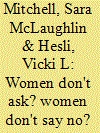| Srl | Item |
| 1 |
ID:
152310


|
|
|
|
|
| Summary/Abstract |
This article attempts to describe the deleterious impact of higher educational changes affecting female faculty members working in Tajik universities in the post-Soviet era. Over the past two decades, the social and economic position women gained during Soviet times has significantly eroded, bringing enormous challenges to education and higher education access, completion and staffing. The demographic and cultural marginalization of women here has negatively impacted university teaching opportunities and the status of women faculty members. Ethnographic interviews – along with relevant secondary data – reveal that despite various official gender-equity policies announced by the state, female participation issues remain prominent in the university. Our interviewees also report continued difficulty entering higher faculty ranks and leadership positions in university. However, significant numbers of women are still to be found there, and they report a workable compromise between being professional educators and trying to navigate a local culture that is becoming more ‘traditional’.
|
|
|
|
|
|
|
|
|
|
|
|
|
|
|
|
| 2 |
ID:
121631


|
|
|
|
|
| Publication |
2013.
|
| Summary/Abstract |
This article examines the dual problems of "women don't ask" and "women don't say no" in the academic profession. First, we consider whether female faculty bargain more or less frequently than male faculty about such resources as salary, research support, clerical support, moving expenses, and spousal accommodation. Analyzing a 2009 APSA survey, we find that women are more likely to ask for resources than men when considering most categories of bargaining issues. This finding goes against conventional wisdom in the literature on gender and bargaining that suggests that women are less likely to bargain than men. Second, we seek to understand if women are reluctant to say no when asked to provide service at the department, college, university, or disciplinary levels. We find that women are asked to provide more service and that they agree to serve more frequently than men. We also find that the service women provide is more typically "token" service, as women are less likely to be asked by their colleagues to serve as department chair, to chair committees, or to lead academic programs. The implications of these results for the leaky pipeline in the academic profession are discussed.
|
|
|
|
|
|
|
|
|
|
|
|
|
|
|
|